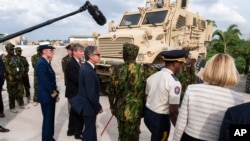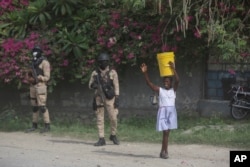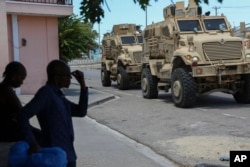During a trip to Haiti on Thursday, U.S. Secretary of State Antony Blinken announced $45 million in new humanitarian aid for the Caribbean nation, which has been wracked by violence for years.
"At this critical moment, you do need more funding. We do need more personnel to sustain and carry out the objectives of this mission," Blinken told a news conference on a rare visit there.
During the visit, Blinken also called for renewing a U.N. mandate for an international security mission to Haiti to fight armed gangs that control much of the country's capital.
The mandate, first approved for 12 months, is set to expire at the beginning of October. Blinken said a U.N. peacekeeping mission could help bring a more sustainable peace to Haiti.
"Much remains to be done, and we're determined to continue," he said. "It's starting to move."
"The Haitian people, not Haitian gangs, will write the country's future," Blinken said.
Blinken's visit to Port-au-Prince underscores U.S. support for Haiti, with additional humanitarian assistance anticipated as the country grapples with gang violence.
On Thursday, Blinken also met with Edgard Leblanc Fils, the head of Haiti's Transitional Presidential Council, in Port-au-Prince, a State Department spokesperson said.
"Both concurred on the critical need to make timely advancements on election preparations," spokesperson Matthew Miller said.
Blinken also will visit the Dominican Republic. His trip to Santo Domingo follows the start of Dominican Republic President Luis Abinader's second term in mid-August.
A senior State Department official told reporters on Wednesday that the United States is prioritizing efforts with its international partners to set up a structure that ensures "a reliable source of financing and staffing" for a security mission in Haiti.
U.S. President Joe Biden's administration is reportedly considering the possibility of transitioning a largely U.S.-funded multinational security force into a traditional U.N. peacekeeping operation.
"A formal PKO [peacekeeping operation] is one of the ways that we could accomplish that, but we're looking at multiple ways to do that," said Brian Nichols, assistant secretary of state for Western Hemisphere affairs.
With about a month left in the mandate of the U.N.-ratified, Kenya-led Multinational Security Support Mission (MSS) in Haiti, progress has been limited, and many pledges remain unfulfilled.
"The one-year anniversary of the mission is October 2, and we're going to work to ensure that it's poised for success and renewal of its mandate in whatever form that takes," Nichols told VOA on Wednesday.
Multinational security assists police
Gang-related violence and drug trafficking have fueled political instability and insecurity in Haiti, leading to an unbearable living situation for the Haitian people.
In October 2022, Haiti requested the deployment of an international force to assist the Haitian National Police in combating heavily armed gangs and facilitating humanitarian aid. In October 2023, the U.N. Security Council authorized the MSS.
The United States and Canada are the top funders of the MSS in Haiti. The first-year estimated cost for the mission is $589 million. The U.S. has already provided $309 million — $200 million toward the MSS mission base and $109 million in financial support.
During a visit to Haiti in July, U.S. Ambassador to the United Nations Linda Thomas-Greenfield announced an additional $60 million in humanitarian assistance for the Haitian people, along with providing armored vehicles for the national police.
Apart from Fils, Blinken met with MSS head Godfrey Otunge and was also to meet Prime Minister Garry Conille and Normil Rameau, head of the Haitian National Police.
Gang violence grips nation
At least 80% of Port-au-Prince is no longer under the control of the Haitian authorities, with violence spreading to other parts of the country.
In the past year, displacement in Haiti has tripled as gang violence grips the Caribbean nation. The United Nations reports that at least 578,000 people have been displaced due to violence, which includes murders, kidnappings and rapes.
The situation is exacerbated by widespread hunger, with nearly half the 11.7 million population facing acute food insecurity.
Gangs, some aligned with political elites, accumulated their control over territory and illicit markets during the tenure of the unpopular former Prime Minister Ariel Henry, who took office after the assassination of President Jovenel Moise in July 2021, according to a Congressional Research Service report.
Henry resigned in April 2024 following the formation of a Transitional Presidential Council.
VOA's Liam Scott contributed to this report.







